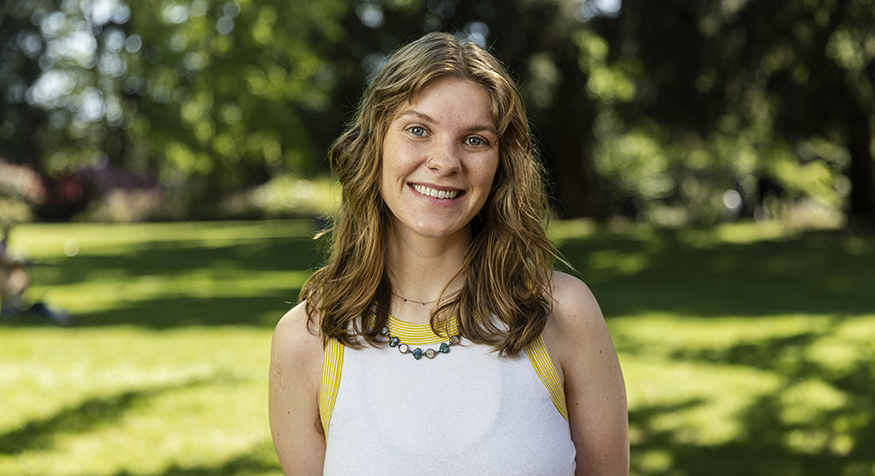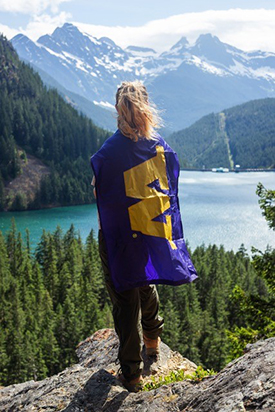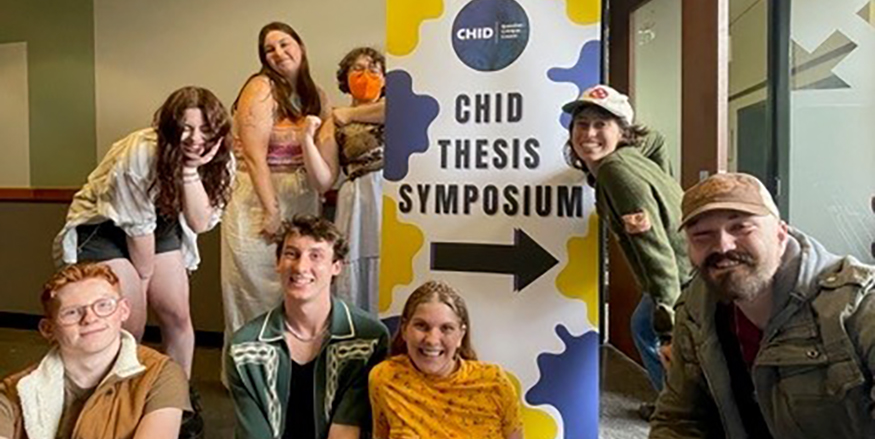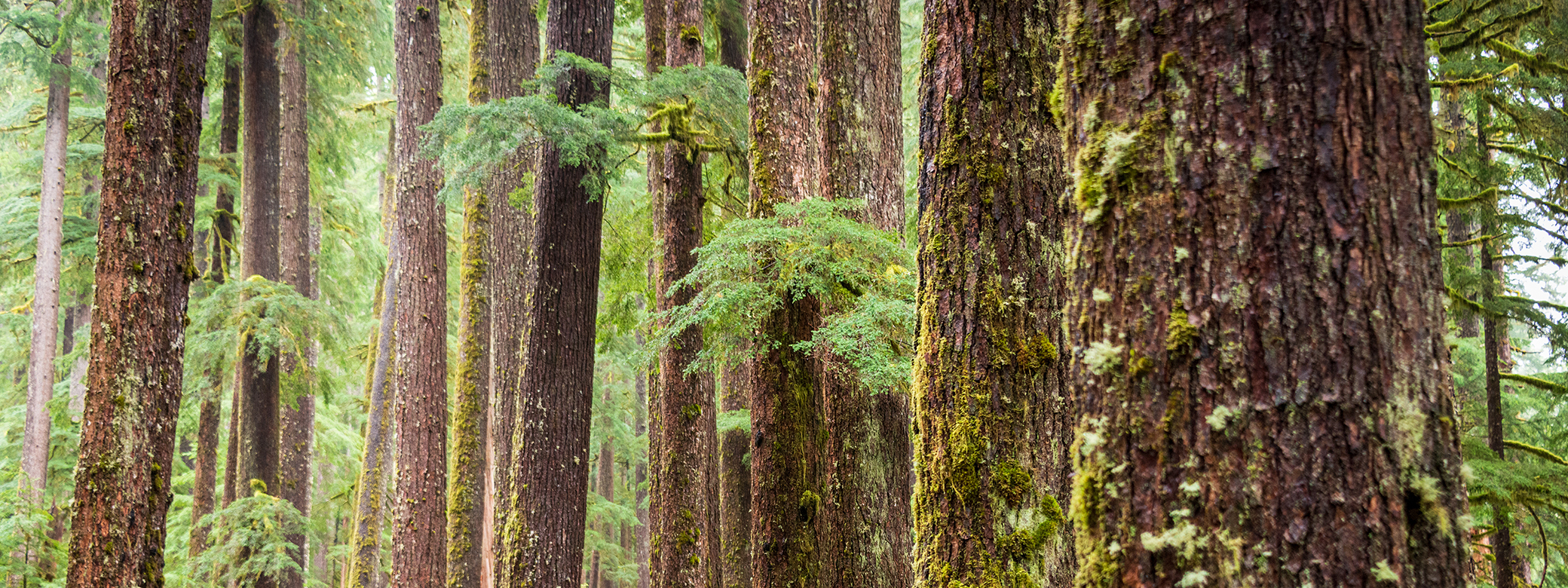
Tisbe Rinehart is at home in the forests of the Pacific Northwest. At the UW, she has shared her love of the Northwest landscape as an outdoor educator and guide with UWild, including trips for first-year students starting their UW experience.
“At first, the students are so nervous about going to the UW,” says Rinehart, who received her BA with departmental honors in comparative history of ideas (CHID) inJune. “By the end of a multi-day adventure trip, they have a friend group and feel more comfortable.”
Rinehart’s own introduction to the outdoors was less idyllic. As a high school sophomore, Rinehart was sent to a Wilderness Therapy program that was, ostensibly, a treatment for troubled teens. The experience was fraught for Rinehart, but it did wake in her an appreciation for the natural world.
It also inspired her senior thesis as a CHID major in the UW College of Arts & Sciences. Combining her Wilderness Therapy experience with extensive research on the Troubled Teen Industry, Rinehart wrote a novel — yes, a novel — about that industry for her thesis. She says the project, which brought together her past and present, has also helped prepare her for the future.
Adventures in the Woods of Washington
Raised in Los Gatos, California, near San Jose, Rinehart chose the UW in part because of its location. “I really liked how it is a beautiful campus that feels like its own city, but it’s in a major metropolitan area,” Rinehart says. “At the same time, national parks are super accessible.”

Rinehart signed up for a UWild trip for first-year students when she arrived on campus and quickly fell in love with the backcountry. She later became a UWild guide, leading one-day adventure trips during the academic year and multi-day trips for incoming first-year students during the summer. She also found time to serve as a UW tour guide with UW Admissions, leading campus tours for prospective students and their families.
Leading outdoor trips for new students has been her favorite role, with one caveat. “There are students five years younger than me now on those trips, and I don’t get any of their references,” Rinehart says, laughing. “It’s interesting how quickly you can feel socially irrelevant. It’s a very humbling experience.”
For the past year, Rinehart has served as student lead for UWild, handling permitting and training other UWild guides. In that role, she has prioritized introducing conversations about equity into the training, particularly related to the lands on which the UW groups hike and camp.
“I’ve focused a lot on the history and futurity of the Indigenous peoples of the Coast Salish Nations, she says. “I wanted to give context to what it means to be a mostly white staff, making money leading other students through Indigenous lands. We’ve discussed our responsibility as educators to address the settler colonial dynamics of being guides.”
No One Right Answer
Those sorts of conversations about identity and responsibility are familiar for Rinehart as a CHID major. The major prioritizes looking at intellectual problems from many perspectives.
“CHID is all about asking questions, encouraging curiosity, and community building,” says Rinehart. “There’s no one right answer, no one right way to get to a conclusion. That’s what I like about the humanities in general.”
There’s no one right answer, no one right way to get to a conclusion. That’s what I like about the humanities in general.
All CHID majors complete a senior thesis, with guidance from a faculty mentor. Selecting a thesis topic was the hardest part for Rinehart. “I remember being in my apartment with a giant concept map, and it just had two words — mental illness — at the center,” Rinehart says. “And from that, everything sprouted. I decided to focus on Wilderness Therapy because it was incredibly influential in my development in both positive and negative ways. It is a core part of my identity that I hadn’t explored. There was a lot of shame around it. It was something I wanted to claim and intellectually explore and make sense of.”
The book Rinehart wrote for her thesis, "Desert(ed) Destinies: Wilderness Therapy as Settler Colonial Violence,” is told through journal entries written by a fictional teen in wilderness therapy, interwoven with a bibliographic essay providing information about the Troubled Teen Industry and its connections to settler colonial violence. The project has helped Rinehart grapple with questions that have troubled her for years. More generally, it has helped her develop research skills that will last a lifetime.
“There’s so much research to be done in the humanities,” she says. “Being at an R-1 research university and partnering with a faculty member one-on-one for this research opportunity has been huge. The best part is that it gives you the tools to be a lifelong learner. I feel like the biggest gain from my thesis is knowing how to pursue what I’m interested in on my own.”
Starting New Traditions
With support from a Mary Gates Research Scholarship, copies of Rinehart’s book have been printed and shared with the UW community, including at the CHID Research Symposium. Now in its second year, the symposium was created — by Rinehart — as an opportunity for CHID students to present their theses to their peers. When Rinehart pitched the idea of a symposium to CHID faculty, they were immediately on board.
“We have CHID students who are just so brilliant and are exploring all these amazing topics,” Rinehart says. “It’s been exciting to have a place to share their research. My hope is the symposium will be a tradition now.” (Rinehart also presented her research at the University-wide Undergraduate Research Symposium.)

Rinehart’s leadership in establishing a symposium is just the latest project she’s taken on. She also started a UW chapter of Students for Sensible Drug Policy, a national student organization that works to end the war on drugs, with an emphasis on decriminalization and harm reduction. Among the UW group’s recent projects is a Narcan and Fentanyl test-strip program they started at Hall Health Center on the UW campus.
Looking back on her time at the UW, Rinehart appreciates the opportunities she had to pursue her passions, in and out of the classroom.
“The UW doesn’t hold your hand, but if you seek out opportunities, people will bend over backward to help you,” she says. “They want you to achieve your goals. That’s been my experience.”
More Stories

What Students Really Think about AI
Arts & Sciences weigh in on their own use of AI and what they see as the benefits and drawbacks of AI use in undergraduate education more broadly.

AI in the Classroom? For Faculty, It's Complicated
Three College of Arts & Sciences professors discuss the impact of AI on their teaching and on student learning. The consensus? It’s complicated.

A Love of Classics and Ballroom
Michael Seguin studied Classics at the UW and now owns Baltimore's Mobtown Ballroom. The two interests, he says, are more connected than they might seem.
